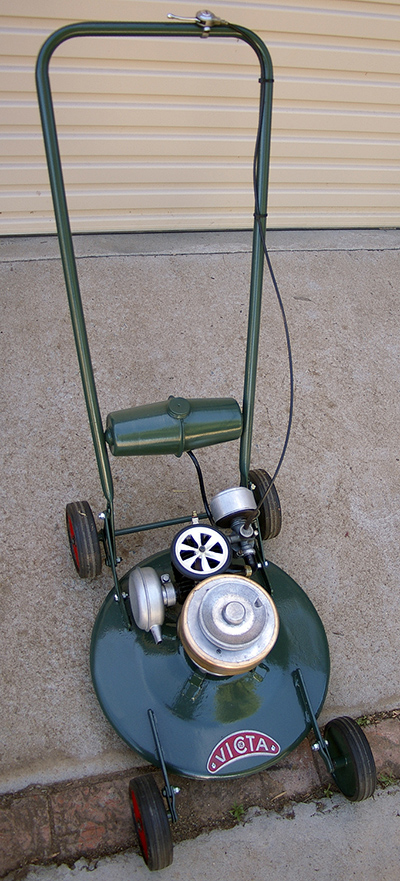Two Stroke or Four Stroke – today we settle the age-old argument
To mow by two or four stroke – today we pull together the hard facts to find out which is best to maintain your lawn.
It’s been discussed over beers, battled over the back fence and has divided families and friends for years, but today, we delve into the age-old dispute of the two stroke versus four stroke lawn mower – and we guarantee a clear winner!
For professionals who care for large scale lawns that need to be cut at shorter heights, there’s no doubt that an engine powered cylinder mower produces the best cut. But unless you’re looking after some of the Central Coast’s best golf courses or bowling greens, such as those we have here at The Greens The Entrance, most of us are familiar with the good old rotary lawn mower.
In 1952, the Victa Mower company produced the world’s first lightweight rotary mower right here in NSW. Demand exploded for the new innovation and the humble Victa mower soon became a world renowned product. It was this two stroke phenomenon that kept Australian lawns looking freshly cut, well manicured and made mowing the lawns a breeze. No more pushing and pulling a manual cylinder mower back and forward, simply start the mower and push for a luscious manicured yard.

All of the early Victas were made using a two stroke engine and there are some clear benefits of a two stroke mower.
The PROs of a 2 stroke
Simplicity
The first win for a 2 stroke mower is simplicity. 2 stroke engines contain less moving parts and are cheaper to build making the cost of a two stroke mower less than that of a four stroke.
Light weight
Weight is also a factor. 2 stroke engines are much lighter than four stroke engines. This was a huge factor back in the early days of push mowers when engine technology wasn’t as advanced as it is today. Larger 4 stroke engines were a lot heavier and bulkier making the two stroke a clear winner when Victa began producing mowers.
Easy maintenance
Another benefit for the old 2 stroke is that less maintenance is required. 2 strokes take a mix of oil and petrol into their fuel tank meaning there’s no need to perform an oil change once a year – simply mix the oil and fuel and go on your way!
Power
Lastly, a two stroke mower has the potential to produce more power from a much smaller engine – however, we’ll talk about this later on as the torque created in a four stroke wins out here.
The PROs of a 4 stroke
Environmental impact
The first, and arguably one of the most important points in favour of a four stroke engine is a cleaner, more efficient burning of fuel. 2 stroke engines burn the petrol/oil mixture in a very inefficient way, meaning that more pollution is put into the air. Because of their environmental inefficiency, the manufacture, production and sale of new 2 stroke lawn mowers is banned in Australia. To illustrate how inefficient 2 stroke mowers are, almost ⅓ of the petrol/oil mixture you put in is dispersed out into the air while running the mower. That said, it’s still perfectly legal to use and even repair your existing 2 stroke lawn mower.
Fuel efficiency

Keeping the environment in mind, the 4 stroke mower is much more fuel efficient. You’ll use a lot less petrol mowing the same sized lawn and these days, with the price of petrol, that’s got to be a big factor in your choice of mower. Most tests have found that a well maintained 4 stroke engine will use ⅓ of the equivalent petrol of a 2 stroke mower, this combined with the fact that 2 stroke engines have mostly remained the same since the 1940s is a clear indication that the 4 stroke wins here.
No need to mix oil and petrol
Who has time to work out ratios of oil and fuel levels. With a 4 stroke mower, simply fill up your jerry can at the petrol station with regular unleaded petrol and put it in the mower. Yes, you do have to keep an eye on the oil level but it’s not hard to check the dipstick every few weeks. A service on your 4 stroke mower is only needed once a year in most circumstances and if you’re not comfortable changing the oil yourself, it’s a standard task for any local mower shop – one that also doesn’t come with a hefty bill.
The noise factor
Have you ever come in after mowing your lawn with ringing in your ears? Or had a neighbour complain about your mower noise? That’s likely because you’re using a 2 stroke – they’re much louder! Therefore, another big advantage of a 4 stroke mower is its noise/decibel level which is far lower than that of a 2 stroke mower.
You’ve got the power
Even though the smaller 2 stroke engines can run faster, they don’t have the torque that a 4 stroke mower has. If you’re not sure what torque means, it equates to rotational force which means that there’s more power in the spinning mower blades, this means that thicker and longer grass is cut more easily using a 4 stroke mower – you simply can’t argue with physics.
The verdict
We know that there’ll always be die-hard fans of the old 2 stroke mower engines, and we don’t blame them. When they were released, 2 stroke lawn mowers were simple, effective and at the time, efficient. Up until 2016, Victa was working hard to economise and reinvent their 2 stroke engines, but decided to pursue their 4 stroke models only. If you’ve still got one, and maintain it well, keep using your 2 stroke, properly maintained and cared for, a 2 stroke will do the job it’s built for, cut your lawn – and it’ll do it well, albeit a little noisier.
Hands down and based purely on the technical factors of environmental impact, petrol consumption, noise, torque and reliability we choose the 4 stroke to mow our lawns. You can’t beat the simplicity of filling the fuel, the ease of pushing the mower through thick grass and the serviceability of a good 4 stroke.
Don’t forget, after you’ve cut your grass, we recommended a nice cold beer – and we’ve got it on tap at The Greenkeepers Shed. If you’re a local of The Entrance, Long Jetty or Blue Bay, pop down after you’ve maintained your lawn and let us pour you one.
Cheers!

